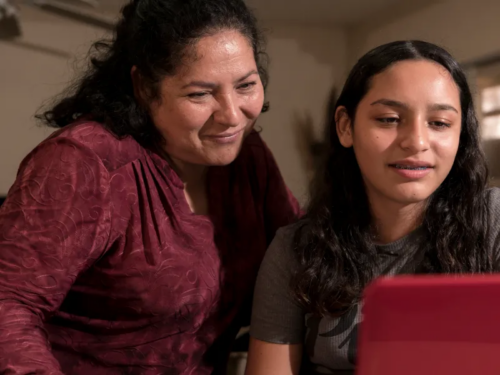
Table of Contents
7 Secrets to Turn Your Family Therapy into a Success
Written By: Charlie Health Editorial Team
March 25, 2022
10 min.
Family therapy provides essential tools to help families understand each other, develop healthier communication skills, and work towards a positive change.
Learn more about our Clinical Review Process
Table of Contents
Families are incredibly resilient. And when differences and conflicts arise, many families come together and work as a team to overcome their challenges.
But family relationships sometimes become strained beyond the members’ capacity to respond—and that’s completely normal. When you need extra support communicating with your family, working with a trusted, compassionate, licensed family therapist can make life easier, healthier, and happier for everyone.
Family therapy is a form of psychotherapy that helps families strengthen their relationships, develop healthier communication skills, and resolve conflicts for a healthier, more functional home life. It can be used as a standalone treatment or as an integral component of an intensive outpatient program (IOP) to lay a strong foundation for successful family healing and recovery.
Above all else, family therapy emphasizes the strength and bond between family members, helping family members work toward healthy relationships and better mental health. As an essential part of IOP treatment, family therapy provides essential tools to help families understand each other, develop healthier communication skills, and work toward positive change.
Whether you’re looking to boost your success in intensive outpatient treatment or starting family therapy for the first time, here’s how to turn your family therapy into a success.
1. Start family therapy with an open mind

Whether you’re starting family counseling to work through specific issues or improve your communication skills, remember that family therapy is a collaborative, inclusive process that focuses on the family as a unit.
Family involvement is a critical component of the healing process, especially for families struggling to interact with a member who has behavioral problems or mental health challenges. In IOPs, family therapy is designed to bring families together by giving them the tools to navigate challenging situations, major life transitions, and other conflicts at the family level.
Family therapists have years of experience navigating family conflicts, from teen depression to grief and financial problems. As experienced mental health experts, they have the expertise needed to help family members discuss specific issues such as divorce or separation, resolve conflicts between parents and children, or navigate the impact of mental health conditions on the entire family.
The sometimes painful process of sifting through family relationships can feel daunting, but we need to confront the past to improve the future. To reap the full benefits of family therapy, you’ll need to start each family therapy session with an open mind and willingness to change. If you’re not open to the ideas and perspectives of other members of the family, it can be difficult to see all the factors that contribute to conflicts or to come up with effective solutions.
Even though it can bring up difficult emotions, there’s nothing to fear about family therapy. It’s a safe, supportive space to work through difficult situations, improve your family relationships, and move forward together.
2. Take time to find the right family therapist
Regardless of your reasons for seeking professional help, finding the right therapist can make all the difference in the therapeutic process. Research shows that your therapeutic relationship—the relationship between you and your therapist—can have long-lasting impacts on your growth, even after therapy ends. Before committing to a family therapist, it’s important to do your research, ask the right questions, and pay attention to your comfort level to find a good fit.
If you’re new to therapy, matching with a family therapist that feels like a good fit might feel like a time-consuming, overwhelming process—but it doesn’t have to be. Once you’ve found a few potential matches from provider directories, referrals from a family doctor, or virtual therapy programs, research their credentials, licensing, and experience with family therapy.
While any type of mental health professional can seek specialized training in family therapy, not all providers have family systems therapy experience or training (which is a specialized and highly effective type of family therapy). It’s also worth considering whether providers have experience with the specific challenges you’re seeking help for. For example, if your son is struggling with his sexual orientation, make sure potential therapists have LGBTQIA+ experience. On the other hand, if your teenager is experiencing substance abuse, an intensive outpatient program with family therapy can provide compassionate one-on-one support alongside family therapy.
After confirming that the therapist has experience with family therapy, it’s time to schedule an initial consultation. If possible, try setting up a group call or meeting in person. The whole family should feel comfortable with the therapist, and nobody should feel like the therapist sides with a specific family member. Above all else, your therapist should be an active listener, and they should provide a safe space for your family to discuss any issues that come up.
You might need to meet with multiple mental health professionals until you find the best fit for your family—and that’s completely normal. In most cases, the conflicts that families encounter before seeking professional help have been going on for some time. As a result, you owe it to yourself and your family not to rush the process of finding a therapist.
Do you need more support with
your mental health?
Charlie Health can help.
3. Prepare for your therapy sessions in advance
In general, most family sessions last around an hour, and family counseling involves once-a-week therapy sessions. However, the frequency of your therapy sessions and the number of sessions you’ll need will depend on your family’s unique needs. For example, if you’re part of an intensive outpatient program, your therapist may recommend twice-weekly family therapy sessions to provide extra support.
With that said, an hour is a short amount of time to work through issues among multiple family members, and you might feel a lot of pressure to get certain issues off your chest during the allotted time. To make the most of your therapy sessions, take the time to prepare beforehand—and encourage your family members to do the same.
If you want to talk about specific issues during therapy, jot them down for your next session. You might write down specific family interactions, questions for your therapist, or behavior patterns that contribute to family conflicts.
4. Set clear goals for family therapy
You might feel like your family will never resolve long-term conflicts, but it’s absolutely possible. By setting tangible goals for family counseling, you can work with family members to find effective solutions. Even if you’re just trying to improve family relationships, it’s possible to take vague ideas for your time in therapy and set meaningful goals to track your progress.
If you’re not sure where to start, consider what kinds of behaviors contribute to arguments and conflicts. The best way to develop goals is to look at your family interactions and write down as many reasons for coming to therapy as you can. For example, if your teenager is living with depression, it might be hard to understand their mental health condition or how to best offer support. Even if you’re worried about your teen’s well-being, conversations can sometimes erupt into arguments, leaving everyone feeling frustrated and angry.
Family therapy provides a unique opportunity to hold an open discussion, and it’s worth taking the time to make sure everyone is on the same page before attending your first family therapy session.
Depending on your family situation and goals, your family therapist may tailor your treatment plan with different techniques and interventions, such as interpersonal therapy (IPT) or cognitive behavioral therapy (CBT). Whether you’re navigating panic attacks or a major life change such as a death in the family, each family member should set goals to track their progress. Contrary to popular belief, therapy isn’t all about sitting in a chair and talking. Although talking is a major component of family therapy, therapy sessions typically incorporate games and activities to improve communication and connectedness between family members.
5. Complement your sessions with individual therapy
Even if you don’t have a diagnosable mental health condition, individual therapy can help you make the most of your mental health treatment and improve your family relationships. In our intensive outpatient treatment program, we offer one-on-one psychotherapy sessions to help adolescents and young adults identify triggers and develop emotional regulation skills. We then bring families into sessions together.
Individual psychotherapy offers countless benefits, from individualized emotional support catered to your unique needs to a private outlet for self-expression, free from fear of judgment from family members. During IOP treatment, you should feel comfortable discussing your challenges, discoveries, and accomplishments openly and honestly. With the help of a psychologist, social worker, or counselor, you can work toward your own personal growth and build healthy coping strategies to deal with stressful situations.
In the case of mental health conditions, such as substance abuse or teenage self-harm, family members can attend family psychotherapy to explore the impact of mental health challenges on a family level and find healthy ways to support each other. At the same time, a family member with a mental health condition can complement their individual therapy sessions with family therapy, and one-on-one sessions can provide parents with support to process conflicts, resentments, and trauma.
Sometimes, families may participate in family therapy even if the affected individual hasn’t sought out their own treatment. In this case, family therapy can help individuals understand the impact of their behaviors on other members of the family. In turn, family therapy can provide a valuable source of social support, motivating individuals with mental health conditions to explore their treatment options.
6. Set healthy boundaries with your family members

Therapy is all about respect, active listening, and compassion—but what do your family relationships look like outside of these sessions? Even if you’re just getting started with family therapy, setting appropriate boundaries is essential to strengthening your relationships. At the same time, it’s not possible to maintain healthy relationships without open, honest communication.
Unfortunately, maintaining appropriate boundaries can be challenging, especially if your relationships with family members are turbulent. Sometimes, passive aggression can cultivate resentment, and feelings of frustration, anger, and irritability can be destructive for any relationship. So, how can you set (and maintain) healthy boundaries?
First, let your family know what you need. Whether you’re seeking professional help for depression symptoms, panic attacks, self-harm, or any other number of issues, you can’t expect your family members to know what your boundaries are if you don’t tell them. It might feel intimidating or awkward to set boundaries, but healthy boundaries can help family members play a long-term supportive role in your life, even after therapy ends.
If your family doesn’t respect your boundaries, bring this up during family therapy. Don’t be afraid to acknowledge your needs and prioritize your well-being, even if makes other family members uncomfortable. Remember: Your mental wellness is the most important thing, and boundaries aren’t selfish. If needed, your family therapist can act as an objective third party to help family members recognize your needs.
7. Practice your new skills outside of therapy
Family therapy can help families work through specific challenges, but attending therapy sessions won’t automatically resolve conflicts or make difficult situations go away. At the end of the day, family therapy helps family members understand one another better, and it can provide helpful skills to cope with challenging situations. It can also help families cultivate a sense of togetherness.
To reap the full benefits of family therapy, you’ll need to commit to practicing your new skills outside of therapy sessions. For example, if your teenager learns how to vocalize their feelings of depression in a therapy session, family members should then try to create a plan for helping them vocalize symptoms of depression at home.
In the case of teen depression, coaching and parent support groups also provide proper education for each family member, giving them the tools and support to understand, connect, and work toward positive mental well-being. During an intensive outpatient program, families can practice these skills to troubleshoot conflicts as problems arise.
If you’re not sure where to start, consider targeting a new skill during a specific daily activity. For example, if you’re working to understand the signs of depression, set a daily reminder to sit down with your teenager and have an open, honest conversation about their feelings without pressuring or interrogating them. Mastering the skills you learned in therapy won’t happen overnight, but slowly incorporating new strategies into your daily life can make home life easier for the whole family.
Ultimately, practicing healthy communication skills and coping strategies can help families create lasting change. It also opens the doors for generational healing, helping families break down generational patterns that contribute to unhealthy family interactions, emotional pain, and problematic behaviors.
Family therapy & IOP at Charlie Health
At Charlie Health, we deliver high-quality, comprehensive mental health care to adolescents, young adults, and their families, so you can work with each other instead of against each other. Our virtual intensive outpatient treatment program (IOP)combines family therapy, one-on-one psychotherapy, and supported groups to build a successful foundation for family recovery that fosters healthy communication and emotional processing.
Whether you’re experiencing mood swings, sadness, low self-esteem, or other mental health challenges, we’re here to help you start feeling better. Our compassionate team of clinicians will help you strengthen your relationships, take care of your mental wellness, and build your toolbox with lifelong coping strategies. Connect with us 24/7.





